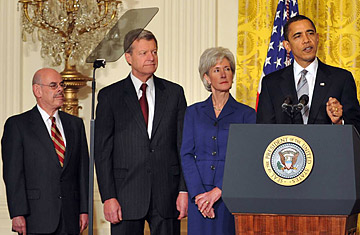
President Barack Obama has nominated Governor Kathleen Sebelius, center, as Secretary of Health and Human Services. From left, Representative Henry Waxman and Senator Max Baucus
As President Barack Obama prepares to convene a health-care summit at the White House later this week, Administration officials are signaling that he intends to pursue a very different strategy for getting reform passed from the one used by his Democratic predecessor in office. Unlike the failed effort of 1994, when Bill and Hillary Clinton presented Congress with a detailed blueprint for reform — and never saw a bill reach the floor of either the House or Senate — Obama is outlining broad principles, with a bottom line of universal coverage, and leaving it up to lawmakers to fashion a plan for meeting them.
What this means is that the next few months will see a wide range of options under consideration, including ideas that go well beyond the health-care plan Obama proposed in his campaign, which centered on effort to expand coverage by requiring employers to provide health insurance to their workers. "Everything has got to be on the table — everything," says Senate Finance Committee chairman Max Baucus, who will be one of the key figures leading the effort on Capitol Hill. (See who's who in Obama's White House.)
At a breakfast with reporters on Tuesday morning, Baucus predicted that his committee could have legislation on the Senate floor as early as June, adding, "The conversation is going great guns." Among the ideas the six-term Montana Senator said he is willing to consider is one that has significant support among Republicans: changing the tax treatment of employer-provided health benefits, so that they might not be fully deductible for companies that provide them, and would be treated as income for the workers who receive them. Health-care experts say this would have the effect of encouraging more people to buy their insurance individually, rather than getting it where they work. This approach has been criticized by many Democrats — including Obama, when John McCain embraced a version of it during the election campaign — who contend that relying on the individual market would put health-care consumers at a disadvantage to big insurance companies.
But one proposal apparently not on his table is the dream of many liberals — a government-run system known as single-payer. The health-care plan that Baucus presented last year would give individuals aged 55 to 64 the opportunity to buy into Medicare, but he dismissed the idea that this could open the door to a single-payer system. "America is not ready for single pay," he said. "We are a bit different from people in other countries. We're not Europe. We're not Canada. We're America ... I think we need to come up with a uniquely American solution." (See the most common hospital mishaps.)
Among his own priorities, Baucus added, a key one is "delivery reform" — changing the system so that medical providers are paid according to the quality of health care they deliver, not the quantity. "That's the biggest opportunity," he said. "It's going to be the driver" of reform. (Read "Obama Moves Health Care to the Front Burner.")
He added that he regularly speaks by phone with Senator Edward M. Kennedy — who in his capacity as head of the Senate Health, Education, Labor and Pensions Committee has been working on the issue at a distance as he undergoes treatment for brain cancer — and has been meeting with some of the key players in the House, including Energy and Commerce Committee chairman Henry Waxman and Ways and Means chairman Charlie Rangel.
But Baucus is also putting effort into building a working relationship with Iowa Senator Chuck Grassley, the ranking Republican on Finance. The two have had weekly lunches for years, he said, "almost to the point where, if you were a fly on the wall, you'd think it was one office." Although the lack of Republican support for the stimulus bill was widely seen as a bad omen for bipartisanship in the bigger endeavors ahead, Baucus said that Grassley has assured him that Republicans are anxious to work with Democrats on health-care reform. "The real effort is to keep this bipartisan," Baucus added. "The assumption here is to find a way to get to yes."
Read "The Year in Medicine 2008: From A to Z."
Read "Obama's Health Czar: Behind the Scenes but Leading the Charge."
